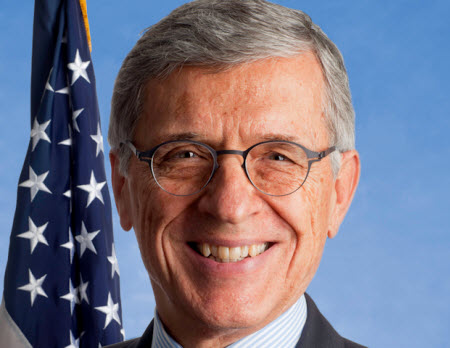Wheeler: No Decision on Departure Date
The smarter way to stay on top of the multichannel video marketplace. Sign up below.
You are now subscribed
Your newsletter sign-up was successful

FCC chairman Tom Wheeler said he has not decided on his departure date.
That came in a press conference following an abbreviated FCC public meeting -- the business took about a minute -- following the dropping of virtually all the agenda items after Republicans asked him to stand down from "controversial" votes.
Related:Wheeler Pulls FCC Votes on BDS, Other Items
Wheeler would not say whether he would stay on, as a commissioner, past when a new chairman was named to make the commission 2-2 until a successor is confirmed for Democrat Jessica Rosenworcel if she is not reconfirmed in the lame-duck Congress and has to leave at the end of next month.
The press conference was longer than the monthly meeting, as Wheeler talked about the items that were not voted, including revamping business data services and expanding the hours and networks providing video-described programming to the blind and hearing impaired.
Wheeler had pulled those and other items because the Republican commissioners had asked him to, he said, pointing out they were still on circulation and could be voted, though the chance of that is slim. He added that he hoped the items would be "quickly addressed" under the next FCC leadership.
Wheeler said he would work on making the transition to a new FCC as smooth as possible, which Republcan congressional leaders had asked him to do, but that he has heard nothing so far from the Trump transition team.
The smarter way to stay on top of the multichannel video marketplace. Sign up below.
He said it was "a shame" that hospitals and small businesses would not get the benefits of his BDS reforms, that it was "truly disappointing" that 1.4 million rural Americans would continue to be deprived of LTE, and "tragic" that 1.3 million blind and sight-impaired would not be getting expanded access to video programming because they had been dubbed "controversial."
Wheeler noted that the items had gotten that label because they were opposed by the largest incumbent firms in the sector. Cable ops and studios and ISPs were all opposed to one or the other of the four items pulled. Wheeler said that when "so-called controversy" is the result of choosing between the common good and the status quo preferred by incumbents, the public interest should win out.
Asked about a Trump Administration effort to roll back any of the things he has been able to vote to adopt, Wheeler said it would be a "real mistake" to keep fast and open networks away from the public, as would undoing his broadband privacy order, as would rolling back broadband access to schools and libraries and low-income residents, as would basically anything counter to the concept that the American economy runs better with "competition, competition, competition."
As to whether he would support legislators getting together on a new network-neutrality bill that would clarify FCC authority, Wheeler said: “I think it is always worthwhile when people try and work together. We tried to work together here on net neutrality. The difference became one of whether you had empty net neutrality with the title but not the reality and the other is whether you had meaningful net neutrality, and I assume that is what the debate is going to continue to be. “
Wheeler did not say whether he would try to wrap up the FCC's review of zero-rating plans in the days left him.
Contributing editor John Eggerton has been an editor and/or writer on media regulation, legislation and policy for over four decades, including covering the FCC, FTC, Congress, the major media trade associations, and the federal courts. In addition to Multichannel News and Broadcasting + Cable, his work has appeared in Radio World, TV Technology, TV Fax, This Week in Consumer Electronics, Variety and the Encyclopedia Britannica.

